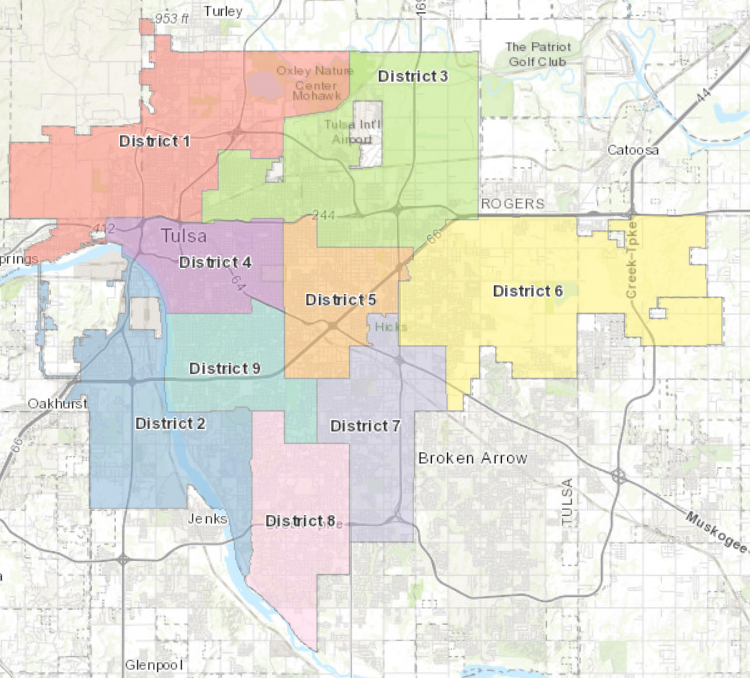2020 City of Tulsa candidate filing period
In addition to the high-stakes presidential race, the City of Tulsa has its own high-stakes elections this year. All nine Tulsa City Councilors and the Tulsa City Auditor are on the ballot every two years, but in presidential years, the Mayor's office is also up for grabs. Filing period begins Monday, June 8, 2020, and ends Wednesday, June 10, 2020. Candidates file in-person at the Tulsa County Election Board, 555 N. Denver (in the old Marina-style Safeway building), between the hours of 8 a.m. and 5 p.m. daily.
I'll stick to the nuts and bolts in this item; later I hope to explain why Tulsans should want to run for office and change the personnel running our city government.
Filing involves filling out a declaration of candidacy, getting it notarized, and presenting it at the county election board with a cashier's check for $50 for the filing fee. The filing fee is really a deposit, intended to deter frivolous candidates: If you get more than 15% of the vote when your name first appears on the ballot, or if you're unopposed, you get the cashier's check back. In lieu of the filing fee, you have the option of filing a petition signed by 300 registered voters in your election district if you're running for council, or city-wide if running for Mayor or Auditor. The information packet with all the forms, including the declaration of candidacy and all ethics disclosure forms, is on the Tulsa County Election Board website.
City elections are governed by Article VI of the City Charter. Council races are run by district. Our council districts were gerrymandered in 2012 evidently with the intent of eliminating then-Mayor Dewey Bartlett's harshest critics. The lines will be redrawn next year following the publication of the 2020 census results by a five-person committee appointed by the mayor and confirmed by the City Council. If the next council consists of the mayor's yes men, the mayor will be able to redraw the district lines to benefit his most loyal councilors.
To find your district, consult the Oklahoma Voter Tool, or use the city's interactive map, or consult this set of static maps, showing the precincts contained within each council district.
Tulsa's municipal elections are non-partisan, and the process has changed since the last mayor's election in 2016, going from three stages to two. The August 25, 2020, election is considered a general election. (The same date is used for runoffs for candidates for Federal and State Legislative offices.)
If two candidates are running for an office, the candidate receiving the most votes at the August election wins. If more than two candidates are running, the number of top candidates whose votes total at least 50% advance to a runoff on November 3, 2020, the same date as the general election for U. S. President, Senator, Congressmen, and state legislators.
To give you an idea of how this would work, suppose the top two candidates for Mayor fell short of 50% of the vote combined in a very evenly divided race.
Candidate A 25%
Candidate B 23%
Candidate C 14%
Candidate D 11%
Candidate E 10%
Candidate F 9%
Candidate G 8%
If these were a regular Oklahoma primary, only Candidates A and B would advance to the November runoff, but because their combined total falls short of 50%, one more candidate, C, would advance. Because A, B, and C's vote share exceeds 50% (62%) only those candidates will advance to November. This is a highly unlikely spread, except perhaps in a race for an open seat; in most cases, it will simply be the top two candidates advancing to the November runoff.
If you're unhappy with a mayor who makes concessions without consulting all stakeholders involved in a decision, if you're unhappy with a mayor who refuses to enact a curfew to protect Tulsa residents and businesses, if you're unhappy with a council that fails to hold the mayor accountable, if you're unhappy with councilors who break their promises to constituents who are facing the destruction of their homes by eminent domain, if you're unhappy that most of our elected officials are beholden to a billionaire who sees Tulsa as a lab rat for social experimentation, you ought to consider running for office. We can't have change unless we have different candidates to choose from.
0 TrackBacks
Listed below are links to blogs that reference this entry: 2020 City of Tulsa candidate filing period.
TrackBack URL for this entry: https://www.batesline.com/cgi-bin/mt/mt-tb.cgi/8695
